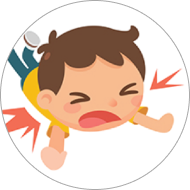Vertigo or Clumsiness
Sleep dysfunctions in children can lead to vertigo or clumsiness due to the critical role sleep plays in brain function, balance, and motor coordination. Here are the main mechanisms by which sleep problems can contribute to these issues::
- Disruption of the Vestibular System
- Cognitive and Motor Impairments
- Impact on Brain Function
- Fatigue and Muscle Control
- Impaired Cognitive Function
- Neurological Effects of Sleep Apnea
- Sleep-Related Migraines and Vertigo
- Effects on Emotional Regulation
- Growth and Development Impact
Addressing the sleep dysfunctions can help improve the brain’s ability to process sensory information and support motor coordination, reducing issues like vertigo and clumsiness.
Sleep dysfunctions in children can lead to vertigo or clumsiness due to the critical role sleep plays in brain function, balance, and motor coordination. Here are the main mechanisms by which sleep problems can contribute to these issues:
1. Disruption of the Vestibular System
- Vestibular System and Balance: The vestibular system, located in the inner ear, is responsible for maintaining balance and spatial orientation. Sleep dysfunctions, especially those involving poor-quality or fragmented sleep, can impair the brain’s ability to process vestibular information properly, leading to feelings of dizziness or vertigo.
- Sensory Processing Impairment: Lack of sleep affects the brain’s ability to integrate and process sensory inputs, including those from the vestibular system. This disruption can result in poor balance and increased dizziness.
2. Cognitive and Motor Impairments
- Coordination and Motor Skills: Sleep is essential for motor learning and coordination. Sleep deprivation or disturbances reduce the brain’s ability to fine-tune motor skills, which can lead to clumsiness, difficulty with movement, and poor coordination.
- Slowed Reaction Time: Sleep dysfunctions slow down reaction time, making it harder for children to adjust their movements and react quickly to environmental changes. This can make them more prone to tripping, stumbling, and accidents, leading to clumsiness.
3. Impact on Brain Function
- Cerebellar Functioning: The cerebellum, which controls coordination and balance, requires adequate sleep to function properly. Sleep deprivation can impair cerebellar activity, making it difficult for children to maintain smooth, coordinated movements, leading to clumsiness or dizziness.
- Impaired Spatial Awareness: Poor sleep affects the brain’s ability to judge distances and spatial relationships accurately, which can lead to a lack of awareness of one’s surroundings. This can cause children to bump into objects or lose their balance more easily.
4. Fatigue and Muscle Control
- Muscle Weakness and Fatigue: Chronic sleep deprivation causes physical fatigue, which can weaken muscle tone and coordination. Tired muscles are less responsive, making movements less controlled and increasing the likelihood of clumsiness.
- Balance Control: Fatigue caused by sleep dysfunctions can weaken postural control, making it difficult for children to maintain their balance while walking or performing other activities. This can lead to dizziness or unsteady movement, increasing the risk of falls.
5. Impaired Cognitive Function
- Concentration and Focus: Poor sleep affects cognitive abilities like attention, focus, and concentration, which are crucial for coordinated movement. Children with sleep dysfunctions may struggle to focus on their movements, leading to increased clumsiness and missteps.
- Executive Function Deficits: Sleep dysfunctions can impair executive functions such as planning and problem-solving. These skills are necessary for anticipating and adjusting movements, so when they’re compromised, children may have difficulty navigating their environment without stumbling or losing balance.
6. Neurological Effects of Sleep Apnea
- Hypoxia and Vertigo: Children with obstructive sleep apnea (OSA) experience periods of reduced oxygen supply (hypoxia) during sleep. Hypoxia can affect brain regions involved in balance and spatial orientation, leading to dizziness or vertigo during the day.
- Frequent Awakenings: Sleep apnea causes frequent night wakings and fragmented sleep, which can leave the brain less rested and impair its ability to regulate balance and coordination, contributing to clumsiness.
7. Sleep-Related Migraines and Vertigo
- Sleep Dysfunction and Migraines: Migraines, which are often triggered by sleep dysfunctions, can cause vertigo as a symptom. Children who suffer from sleep-related migraines may experience bouts of dizziness or imbalance during the day, leading to difficulties with coordination.
- Vestibular Migraines: In some cases, sleep deprivation can trigger vestibular migraines, which specifically affect the vestibular system and cause episodes of vertigo, nausea, and balance issues.
8. Effects on Emotional Regulation
- Increased Anxiety and Dizziness: Sleep dysfunctions can heighten anxiety, which is a known trigger for dizziness and balance issues. Children who experience both poor sleep and anxiety may report feelings of lightheadedness or vertigo more frequently.
- Clumsiness from Overstimulation: Emotional dysregulation due to sleep deprivation can make children more susceptible to sensory overload, leading to confusion and uncoordinated movements, contributing to clumsiness.
9. Growth and Development Impact
- Delayed Motor Development: In younger children, sleep dysfunctions can delay motor development, making it harder for them to learn coordinated movements. These delays can manifest as clumsiness or difficulty with balance-related tasks, such as running, jumping, or climbing.
- Weaker Muscle Growth: Sleep is essential for physical growth, including muscle development. Inadequate sleep can lead to weaker muscles, which reduces a child’s ability to control their movements with precision.
Addressing the sleep dysfunctions can help improve the brain’s ability to process sensory information and support motor coordination, reducing issues like vertigo and clumsiness.

